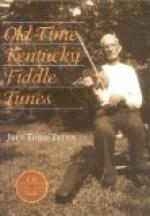“Fast color,” she said happily, looking at the mighty letters of its coarse black print. “Ain’t faded none, nor run, a mite.” This plainly give her great relief. Deftly she turned each leaf, using the extremest care to avoid tearing them, handling them with loving touch. Between them she laid little pine cones, so that air might circulate among them and assist the process of their drying. Then, having wrung her clothing till her strong, brown, slender wrists ached, she spread that out in turn, but on less favored rocks, and, as her feeling of security increased, fell into an unconscious dance, born of the necessity of warmth from exercise, but so full of grace, abandon, joy, that a poet might have fancied her a river-nymph, tripping to the reed-born music of the goat-hoofed Pan.
When, later, she had slowly dressed, and was kneeling at the pool’s edge, using the now placid surface of the water as a mirror to assist her in rough-fashioning her hair into a graceful knot, she heard again, from a great distance, a metallic “tink, tink-tink,” which had caught her ear when she had first stood on the pool’s edge. It came, she knew, from far, however, and so did not rouse her apprehension, but, mildly, it aroused her curiosity.
“Hull kentry’s ‘full o’ furriners,” she mused. “That railroad buildin’ business in the valley brings ’em. Woods ain’t private no more.” Again the tink, tink-tink. “Sounds like hammerin’ on rocks,” she thought. “It’s nearer than th’ railroad builders, too. I wonder what—but then, them furriners are wonderful for findin’ out concernin’ ev’rythin’.”
She hugged her pulpy spelling book against her breast with a little shiver of determination. “I’m goin’ to l’arn, too,” she said with firm decision as she scrambled up the rough and rocky mountain path.
For a time, as she progressed, her thoughts remained afield, wandering in wonder of what that “furriner” might be up to with the tink-tink of his hammer upon rocks. This soon passed, however, and they dwelt again on the pool episode.
She had never seen a man dressed as the stranger had been. A carefully made shooting-jacket had covered broad and well-poised shoulders which were free of that unlovely stoop which comes so early to the mountaineer’s. A peaked cap of similar material had shaded slightly a broad brow with skin as white as hers and whiter. Beneath it, eyes, which, although they were engaged in anxious search when she had seen them, she knew could, upon occasion, twinkle merrily, had gazed, clear, calm, and brown. A carefully trimmed mustache had hidden the man’s upper lip, but his chin, again a contrast to the mountaineers’ whom she had spent her life among, showed blue from constant and close shaving. Yet, different as he was from her people of the mountains, as she recalled that face she could not hate him or distrust him.
She had never in her life seen any one in knickerbockers and leggins before, and the memory of his amused her somewhat, yet she admitted to herself that they had seemed quite “peart” as she peered at them through the reeds.




